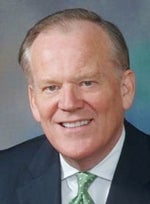Much At Stake For Mass. In Census Results

New England has a lot at stake in the 2010 Census, not just in terms of federal dollars for dozens of programs that support education, housing and health-care services, but also the region’s clout on Capitol Hill.
According to research by Election Data Services, Massachusetts may lose one of its 10 seats in the House if the districts for representation were determined based on the 2009 population.
The Virginia-based political consulting firm found that Massachusetts was one of eight states in danger of losing a seat. At the same time, other states such as Arizona, Florida, Georgia, Nevada, South Carolina, Utah and Washington, may each pick up a seat. And Texas could add three seats, the report noted.
With changing demographics, it has become even more important that the region’s congressional delegation work collectively on issues and present a unified voice on legislation that is important for the New England economy.
Regional Concern
Massachusetts, and indeed New England, has been plagued by slow population growth. New England has the oldest median age in the country and out-migration has risen sharply since 2000, according to research conducted by Northeastern University’s Center for Labor Market Studies. There are other challenges to the population count that are also unique to the completion of the census.
New England is home to significant numbers of some hard-to-count populations including non-English speaking residents, who may be reticent to participate, and college students, who fail to fill out the census forms.
All these factors could have an impact on the region’s political future. Over the years, New England has sent fewer representatives to Capitol Hill while other regions have increased their numbers.
In 1910, New England held 32 seats in the House of Representatives, compared to 33 for Texas, Florida and California combined. Today, New England has 22 seats in the House, while Texas (32), Florida (25) and California (53), are sending a total of 110 representatives to the House.
That said, it’s more important than ever for the six states to work together to shore up their voice in Washington.
Collaboration has been a hallmark of New England’s ability to grow its economic engine. Leveraging our shared geography, history and culture has served the region well.
Consider funding from the National Institutes of Health, which doubled in the last decade, during the period from 1998 to 2003, in part from the collective advocacy of the region’s elected officials.
New England’s delegation has for a long time recognized that an efficient transportation system doesn’t begin and end at state lines.
The delegation has historically worked together to bring billions of dollars in federal infrastructure support to upgrade and advance its system of highways, bridges and rail.
And in 2005, when the federal government was eyeing the closure of dozens of military bases as part of the Base Realign-ment and Closure Commission, many sites in New England and thousands of jobs were saved when the delegation came together — not as individual states, but as a region — to argue against the closures.
Leadership in the six New England states recognized decades ago that the success of the region’s economy is linked to the strength of its regional identity.
We must continue to work closely with the entire New England congressional delegation and explore issues from a regional perspective and work in a bipartisan environment.
And we must identify other areas of the country which share our priorities, in areas such as transportation, energy and healthcare, and build relationships with the business and political leadership in those states.
To do so will benefit not only the region, but also the nation as a whole as we work toward our shared goal of economic recovery.
James Brett is president and CEO of the Boston-based New England Council.









0 Comments